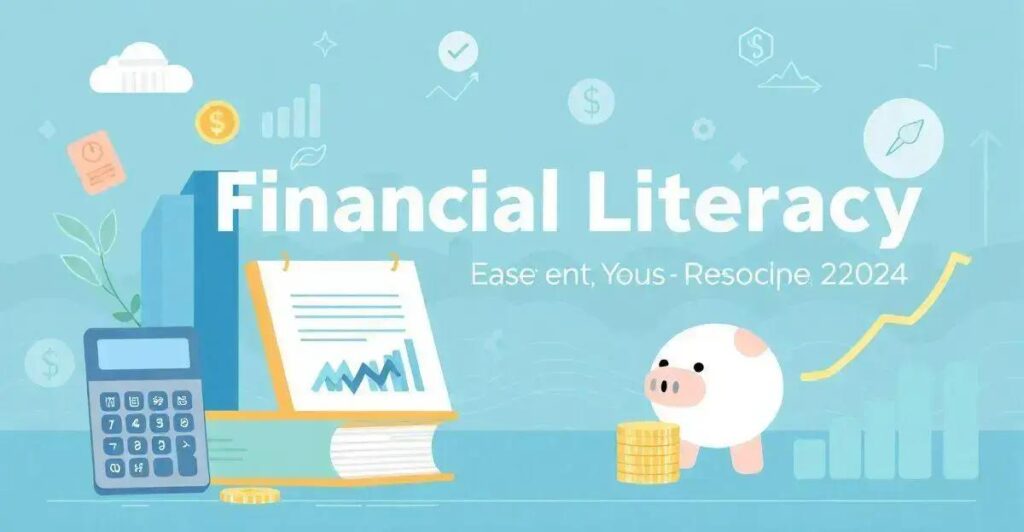Are you tired of feeling overwhelmed by financial jargon and struggling to make sense of your financial situation? Mastering financial literacy can be a game-changer, providing you with the tools and confidence to make informed decisions about your money.
As the saying goes, ‘knowledge is power,’ and financial literacy is no exception. By understanding the fundamentals of personal finance, you can take control of your financial destiny and achieve your long-term goals.
In this post, we’ll explore the importance of financial literacy and provide practical tips for building a stronger financial future.
Understanding the Importance of Financial Literacy
Financial literacy is the key to making informed decisions about your money. It’s the ability to understand and manage your financial affairs effectively, making it possible to achieve your long-term goals. Without financial literacy, you’re more likely to fall prey to financial scams, struggle with debt, and miss out on investment opportunities. In today’s fast-paced world, it’s crucial to stay ahead of the game and develop a strong understanding of personal finance. By doing so, you’ll be better equipped to make smart financial decisions, build wealth, and secure your financial future.
A strong financial foundation is built on a solid understanding of your income, expenses, and financial goals. It’s essential to create a budget that accounts for all your financial obligations, including rent/mortgage, utilities, and debt payments. You should also prioritize saving and investing for the future. A well-planned financial strategy can help you avoid financial pitfalls, reduce stress, and achieve your long-term goals. By building a strong financial foundation, you’ll be better equipped to handle unexpected expenses, take advantage of investment opportunities, and achieve financial stability.
Debt and credit management are critical components of personal finance. Effective debt management involves creating a plan to pay off high-interest debt, negotiating with creditors, and avoiding new debt. Credit management involves monitoring your credit report, paying bills on time, and maintaining a healthy credit utilization ratio. By managing debt and credit wisely, you can improve your credit score, reduce financial stress, and achieve long-term financial stability. Remember, debt and credit are tools that can be used to your advantage when managed properly.
A budget is a tool that helps you manage your finances effectively. It’s essential to create a budget that accounts for all your financial obligations, including income, expenses, and savings. By prioritizing needs over wants, you can create a budget that works for you. Saving is also crucial for achieving long-term financial goals. You should aim to save at least 10% to 20% of your income each month. By creating a budget and saving regularly, you can achieve financial stability, build wealth, and secure your financial future.
Investing is a key component of building wealth. It’s essential to understand the different types of investments, such as stocks, bonds, and real estate, and how they can help you achieve your financial goals. By starting early and consistently investing, you can build a significant nest egg over time. It’s also essential to diversify your investments to minimize risk and maximize returns. By investing wisely, you can achieve financial freedom, build wealth, and secure your financial future.
Building a Strong Financial Foundation

Financial literacy is the foundation of making informed decisions about your money. It enables you to understand and manage your financial affairs effectively, allowing you to achieve your long-term goals. Without financial literacy, you’re more likely to fall prey to financial scams, struggle with debt, and miss out on investment opportunities. In today’s fast-paced world, it’s crucial to stay ahead of the game and develop a strong understanding of personal finance.
A strong financial foundation is built on a solid understanding of your income, expenses, and financial goals. It’s essential to create a budget that accounts for all your financial obligations, including rent/mortgage, utilities, and debt payments. You should also prioritize saving and investing for the future. A well-planned financial strategy can help you avoid financial pitfalls, reduce stress, and achieve your long-term goals.
Debt and credit management are critical components of personal finance. Effective debt management involves creating a plan to pay off high-interest debt, negotiating with creditors, and avoiding new debt. Credit management involves monitoring your credit report, paying bills on time, and maintaining a healthy credit utilization ratio. By managing debt and credit wisely, you can improve your credit score, reduce financial stress, and achieve long-term financial stability.
A budget is a tool that helps you manage your finances effectively. It’s essential to create a budget that accounts for all your financial obligations, including income, expenses, and savings. By prioritizing needs over wants, you can create a budget that works for you. Saving is also crucial for achieving long-term financial goals. You should aim to save at least 10% to 20% of your income each month.
Investing is a key component of building wealth. It’s essential to understand the different types of investments, such as stocks, bonds, and real estate, and how they can help you achieve your financial goals. By starting early and consistently investing, you can build a significant nest egg over time. It’s also essential to diversify your investments to minimize risk and maximize returns.
Managing Debt and Credit
Effective debt management involves creating a plan to pay off high-interest debt, negotiating with creditors, and avoiding new debt.
Credit management involves monitoring your credit report, paying bills on time, and maintaining a healthy credit utilization ratio.
You can also consider debt consolidation, credit counseling, and debt settlement as options to manage your debt.
By managing debt and credit wisely, you can improve your credit score, reduce financial stress, and achieve long-term financial stability.
It’s essential to prioritize debt repayment and credit management to avoid financial pitfalls and achieve your financial goals.
Creating a Budget and Saving

Creating a budget is an essential step in managing your finances effectively. It helps you track your income and expenses, identify areas where you can cut back, and make informed decisions about how to allocate your resources.
To create a budget, start by categorizing your expenses into needs and wants, and then prioritize your spending based on your financial goals. You should also set aside a portion of your income for savings, which can help you build an emergency fund and achieve long-term financial goals.
By creating a budget and saving regularly, you can improve your financial stability, reduce stress, and achieve a sense of security.
Investing and Growing Your Wealth
Investing is a key component of building wealth. It involves putting your money into assets that have a high potential for growth, such as stocks, bonds, and real estate.
By investing wisely, you can earn a decent return on your investment and grow your wealth over time. It’s essential to diversify your investments to minimize risk and maximize returns.
You can also consider investing in a retirement account or a 401(k) plan to save for your future.
By investing and growing your wealth, you can achieve financial freedom and secure your financial future.
Conclusion: Empowering Your Financial Future

The adoption of Artificial Intelligence (AI) can bring numerous benefits to small businesses, from automating repetitive tasks to personalizing customer service and analyzing data.
The implementation of AI should be done gradually, identifying areas that can benefit immediately and conducting pilot projects to assess the efficiency of these solutions.
Success Stories
Success stories in different sectors show how AI can be a powerful tool to boost growth and improve operational efficiency.
With AI, small businesses can not only compete on equal footing with larger companies but also innovate and create new opportunities in the market.
Therefore, do not overlook the potential of AI to revolutionize your business.
Frequently Asked Questions about Artificial Intelligence in Small Business
How can task automation benefit my small business?
Task automation frees up your team from repetitive tasks, increasing productivity and allowing them to focus on more strategic tasks.
What tools can I use for data analysis?
There are various tools available, such as Google Analytics, Tableau, and Microsoft Power BI, that help collect and interpret valuable data.
What are chatbots and how do they improve customer service?
Chatbots are virtual assistants that can answer questions and resolve problems 24/7, improving the customer experience and freeing up your team.
How can I personalize the customer experience?
Through data analysis, you can understand better the customer’s preferences and offer personalized recommendations and promotions.
Why is customer feedback important?
Feedback is essential to identify areas that need improvement and adjust your strategy to ensure customer satisfaction.
Is artificial intelligence accessible to small businesses?
Yes, there are various AI solutions that are accessible and scalable for small businesses to improve efficiency and customer service.



